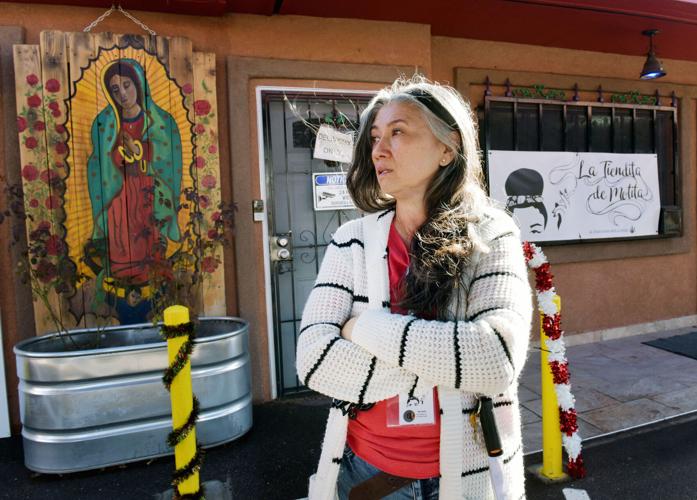ALBUQUERQUE — Mary Jean Garcia and her business partners sold their cars and personal belongings, dipped into savings and emptied retirement accounts to open La Tiendita de Motita, a cannabis dispensary in Albuquerque’s South Valley, the rough-and-tumble neighborhood they grew up in.
The former Albuquerque teacher, along with three of the four other women, quit their jobs as educators to open the Isleta Boulevard dispensary five months ago.
To obtain licensure, they were required by the state Cannabis Control Division to develop a company policy called a social equity plan that would encourage and promote hiring people who are either minorities or who have been victims of the nation’s so-called war on drugs.
Garcia and her colleagues are among a growing number of licensed cannabis operators who say they are mandated to follow a social equity plan while the state has neglected to implement its own social equity policy — and as a result they have been denied potential opportunities and benefits as social equity candidates themselves.
“We fit, literally, the minority definition of the social equity plan,” said Jamie Munsey, a partner of the operation. “In our group, we have a member of the LGBTQ community, an immigrant and another immigrant.”
Garcia said her company has never been asked by anyone from the state Cannabis Control Division if its owners would qualify as social equity applicants.
“There is no place to apply as a social equity applicant,” she said during an interview at her shop.
Garcia’s bright red lipstick matched her holiday earrings, which dangled as she spoke. She is put together, alert, articulate. No one would guess she is a victim of the war on drugs or that she lacked opportunities as a South Valley kid, or that a beloved uncle spent his life in and out of jail for drug use that started with a minor marijuana offense — a misstep that is no longer a crime in the state.
“He couldn’t get a job due to the minor offense, and it created a cycle of poverty and need,” Garcia said. “He wound up in for life. I have his record here. I printed it out when I started this. He had some [expletive] offenses on there, too, but his very first offense was a minor possession. It was, for him, a medicine.”
Though they should qualify for state assistance under a detailed equity policy advocates say is a cornerstone of New Mexico’s cannabis law to ensure the industry is open to those harmed by discriminatory drug policies in the past, Garcia and her partners would not have been able to open their business had they not sacrificed their own possessions and bank accounts, they said.
“If it was just me, it wouldn’t have happened. It took all five of us,” said Laura Legarda, another partner in the business.
Funding was only one hurdle, the woman said. They needed help with a business plan and navigating state regulations. They had to find a building, lease it, obtain utilities, install a security system and detailed lighting, provide a point-of-sales system and acquire product tracking devices.
La Tiendita de Motita’s location alone serves as one qualifying criteria for each of its operators, said Ernest Toney, founder of Colorado-based Bipocann, which helps minority-owned businesses in states that regulate cannabis.
The nation’s war on drugs, he said, was “really the war on race.” Like other advocates of social equity in legalized cannabis markets, Toney believes there must be polices, practices and pathways for people harmed by the war to benefit from the new industry.
Of the 13,280 households in Albuquerque’s South Valley, 81% are Hispanic, according to census data. Fifty percent speak English. The median household income is just over $40,000. Fifteen percent of its residents are educated at the university level, compared to 37% citywide.
“We don’t have a lot of opportunities here,” she said. “There’s a lot of illegal drugs available from a very young age. Drugs take away the pain. It’s not always an easy life here.”
“With our business located in an area that has been unfairly regulated by previous marijuana laws and arrests,” Munsey said, “we’re making sure that at some point, members of this community are hired.”
H/T: www.santafenewmexican.com



